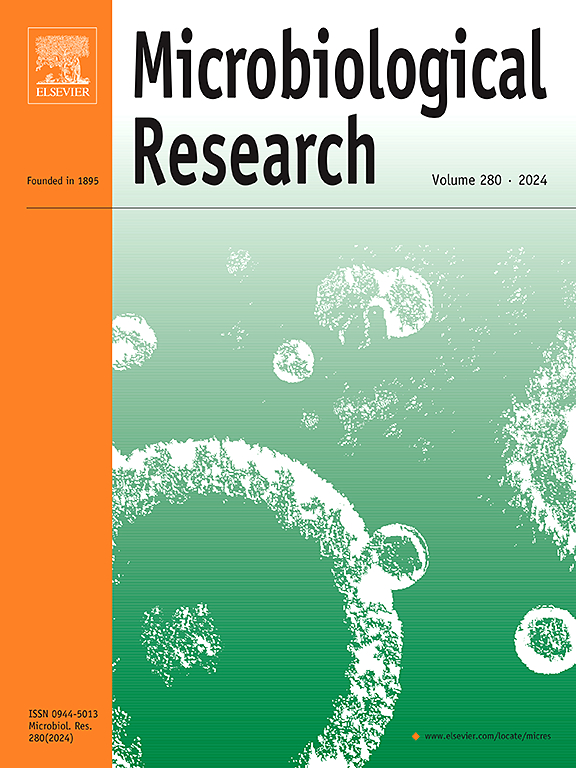Exploring the potential role of soil protists in predicting banana health
IF 6.1
1区 生物学
Q1 MICROBIOLOGY
引用次数: 0
Abstract
Fusarium wilt is increasingly threatening banana production around the world. Investigating soil microbial communities associated with healthy and diseased banana plants is the first step to understand the potential mechanisms involved in the disease suppression. Previous research has confirmed plant-beneficial bacterial and fungal communities are key determinants of banana health. However, to what extent protists, a key component of the soil microbiome, are linked to banana health on a large scale remains largely unknown. Here, we collected soil samples from healthy and diseased plants suffering from Fusarium wilt in multiple banana plantations within China and Laos, and examined holistic soil microbial communities including bacteria, fungi and protists using high-throughput sequencing. We explored the linkage between protists and Fusarium oxysporum and investigated the effects of biotic and abiotic factors on protists. Results showed the relative abundance of Fusarium oxysporum can be highly predicted by protists. Specifically, predatory protists revealed a negative correlation with F. oxysporum, which was confirmed in pot experiments. We found the putative plant growth-promoting bacteria, positively correlated with predatory protists, were also negatively correlated with F. oxysporum. In addition, both soil abiotic factors (i.e., soil pH and ammonia nitrogen) and biotic factors (soil bacteria) played crucial roles in determining predatory protists. We highlighted that soil predatory protists might contribute to banana health via directly inhibiting soil-borne pathogens or indirectly enriching plant beneficial bacteria.
探讨土壤原生生物在预测香蕉健康中的潜在作用
枯萎病正日益威胁着世界各地的香蕉生产。研究与健康和患病香蕉植株相关的土壤微生物群落是了解疾病抑制潜在机制的第一步。先前的研究已经证实,有益植物的细菌和真菌群落是香蕉健康的关键决定因素。然而,作为土壤微生物组的关键组成部分,原生生物在多大程度上与香蕉的健康有关联,在很大程度上仍然是未知的。在这里,我们收集了来自中国和老挝多个香蕉种植园的健康和患病枯萎病植株的土壤样本,并使用高通量测序技术检测了包括细菌、真菌和原生生物在内的整体土壤微生物群落。探讨了原生生物与尖孢镰刀菌的联系,探讨了生物和非生物因素对原生生物的影响。结果表明,尖孢镰刀菌的相对丰度可由原生生物高度预测。其中,捕食性原生生物与尖孢镰刀菌呈负相关,这在盆栽实验中得到了证实。我们发现,植物生长促进菌与掠夺性原生生物呈正相关,与尖孢镰刀菌呈负相关。此外,土壤非生物因子(即土壤pH和氨氮)和生物因子(土壤细菌)在决定掠食性原生生物中都起着至关重要的作用。我们强调,土壤掠食性原生生物可能通过直接抑制土传病原体或间接丰富植物有益菌来促进香蕉的健康。
本文章由计算机程序翻译,如有差异,请以英文原文为准。
求助全文
约1分钟内获得全文
求助全文
来源期刊

Microbiological research
生物-微生物学
CiteScore
10.90
自引率
6.00%
发文量
249
审稿时长
29 days
期刊介绍:
Microbiological Research is devoted to publishing reports on prokaryotic and eukaryotic microorganisms such as yeasts, fungi, bacteria, archaea, and protozoa. Research on interactions between pathogenic microorganisms and their environment or hosts are also covered.
 求助内容:
求助内容: 应助结果提醒方式:
应助结果提醒方式:


